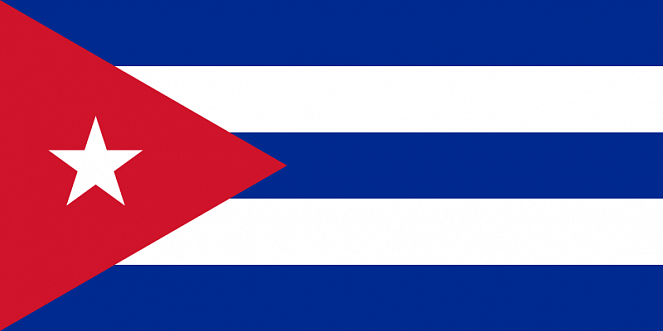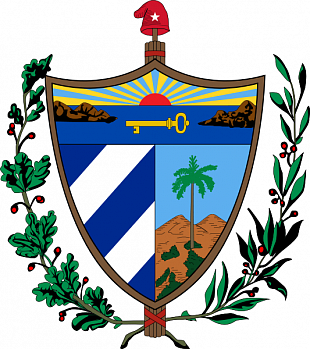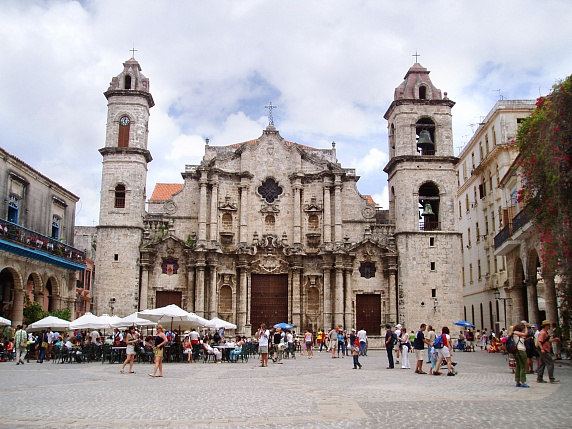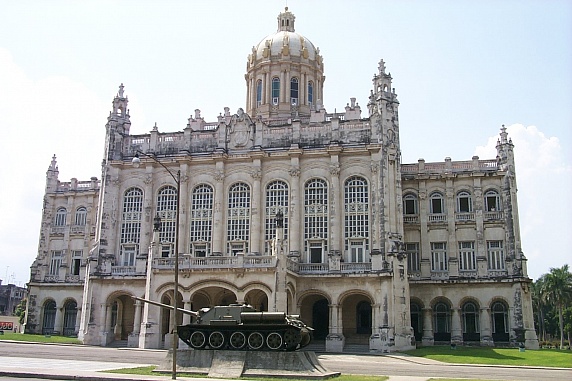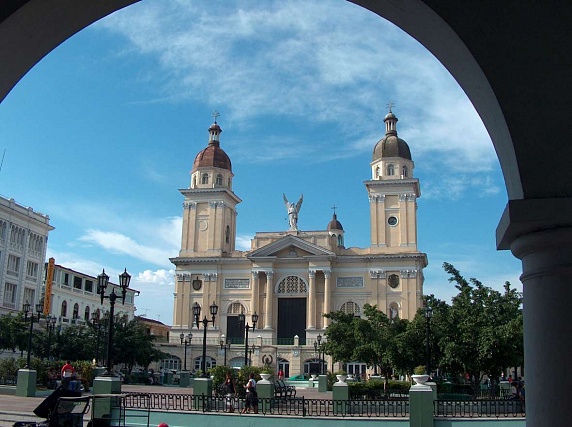 la República de Cuba
la República de Cuba
Joint article by Foreign Minister Sergey Lavrov and Foreign Minister of Cuba Bruno Rodriguez Parrilla on the 60th anniversary of restoring Russian-Cuban diplomatic relations, published by Rossiiskaya Gazeta and Cuba’s Granma, May 8, 2020
Russia and Cuba share long-standing fraternal ties. The contacts between our people are rooted in the 18th century, when in 1782 Russian doctor Fyodor Karzhavin arrived in the Cuban capital and having spent two years there embraced the ideas that would later lead Cubans to fight for independence from the Spanish colonial rule.
In the essays he wrote for the Russian press, Karzhavin not only extolled Cuba’s rich nature and fascinating culture, but also spoke out against harsh treatment of slaves. It was during the War of Independence that three Russian volunteers joined the Liberation Army Corps becoming the first time when Russians and Cubans spilled blood together in the name of freedom.
Russia and the Republic of Cuba established official contacts in 1902, laying the groundwork for bilateral relations between the two countries.
In the 20th century with its geopolitical shocks and upheavals the two countries traced the path of their shared history. At all times, mutual sympathy between our peoples, their commitment to achieving justice and equality and follow their sovereign development path dominated our relations at all times. We share common fundamental values and understanding of history.
This month, as we mark the 75th anniversary of Victory in the Great Patriotic War, we need to remember that the Soviet-Cuban relations were first established in October 1942, at a time of a powerful anti-fascist movement on the island, where over 100 committees were established in support of the USSR. We honour the memory of immortal heroes who sacrificed their lives to save our civilisation from fascism, including Cubans who fought far from home on the frontlines of the Second World War: Red Army fighter Aldo Vivó Laurent who died on the Neva Bridgehead, and his brother, Jorge Vivó Laurent who joined a guerrilla unit near Leningrad, as well as Enrique Vilar Figueredo who fell in combat during the liberation of Poland.
In 1952, in an international environment marked by the Cold War, dictator Fulgencio Batista decided to sever ties with the Soviet Union, owing to his political dependence on the United States. This move ran counter to the will of the Cuban people, and was made despite the long-standing track record of friendly ties that our countries shared in many spheres.
This history was marked by a number of remarkable events, including the famous competition between Alexander Alekhin and Jose Raul Capablanca, who fought for the title of world chess champion in 1927. Cultural ties included visits to Cuba by legendary ballerinas Anna Pavlova and Maya Plisetskaya, the true ambassadors of art, as well as performances by Alberto Alonso on Bolshoi Theatre’s stage.
The victory of the Cuban Revolution in 1959 lay the groundwork for establishing brotherly ties between our countries. Commander-in-Chief Fidel Castro Ruz pioneered the restoration of diplomatic relations, sealed on May 8, 1960 as a testimony to the sincere friendship between our peoples, mutual respect for their sovereign interests and the fact that the two countries shared common views on social and economic development.
These ties consistently strengthened, evolving into a strategic partnership that we have been able to consolidate through proactive political dialogue at the highest level, and guided by common positions on the main issues on the international agenda.
The contemporary history of our countries was written by world-class personalities. The leader of the Cuban Revolution, Fidel Castro Ruz, paid his first visit to Russia in 1963, as part of his historical tour of the Soviet republics, preceded in 1960 and 1962 by Army General Raul Castro Ruz, then Minister of Revolutionary Armed Forces, First Secretary of the Communist Party of Cuba’s Central Committee. People from both countries cherish the memories of these visits that paved the way to stepping up exchanges at all levels for years to come.
The founders of the USSR-Cuba Friendship Society, first Soviet cosmonaut Yury Gagarin and Comandante Ernesto “Che” Guevara played an important role in strengthening ties between the two peoples.
Russia and Cuba are satisfied with the results achieved during regular contacts at the highest level, exemplified recently by the visit to Moscow in 2019 by President of Cuba Miguel Diaz-Canel Bermudez, who held a brotherly meeting with his Russian counterpart, Vladimir Putin, as well as with other senior officials on matters of politics, trade and the economy. It is also worth noting the visit by Prime Minister of Russia Dmitry Medvedev to Havana in October 2019.
In addition, our two countries maintain regular ties at the parliamentary level. In this regard, it is worth highlighting the recent visit to Cuba by Speaker of the Federation Council, Valentina Matviyenko, who headed the Russian delegation at the celebrations of Havana’s 500th anniversary.
Our states are working on a bilateral economic agenda, primarily by way of interacting within the Intergovernmental Russian-Cuban Commission on Trade, Economic, Scientific and Technical Cooperation. Much is being done to stimulate joint projects in energy, metallurgy, transport, IT and telecommunications, space research, combating climate change, biotechnology, healthcare and the pharmaceutical industry. These projects are also contributing to Russia’s effective participation in implementing the 2030 National Plan for Social and Economic Development of the Republic of Cuba. These ties rely on a mutually advantageous interaction and seek to improve the quality of life.
In addition to the above bilateral projects, cultural and humanitarian ties, as well as the people-to-people contacts, are expanding. The renovation of the Havana National Capitol’s dome timed to the 500th anniversary of the Cuban capital is a case in point. Russia and Cuba are implementing projects such as using Heberprot-P for treating diabetic foot ulcer. The Russian-Cuban Medical Centre in Nizhny Novgorod, as well as joint projects in other regions, in particular, St Petersburg, Tula and Chelyabinsk, feature prominently in these efforts.
In recent years, Russians have become increasingly interested in Cuba’s spectacular beauty, and the number of Russian tourists visiting the island annually exceeded 100,000.
The governments of our countries consider political consultations between the two foreign ministries highly beneficial. They regularly exchange views on the most pressing issues of the international agenda. We use joint efforts to advocate respect for international law enshrined in the UN Charter, as well as respect for sovereignty and non-interference in the internal affairs of other states. We are working shoulder to shoulder to build a more just and democratic system of international relations that provides all states with equal opportunities for sustainable development.
The joint statement on common approaches to international affairs signed by Vladimir Putin and Miguel Diaz-Canel during the Cuban President’s visit to Moscow in 2018 reaffirms our commitment to creating a multilateral and multipolar international order which would reflect the plurality of political, socioeconomic and cultural models, guarantee international peace and security, global and regional stability, sovereign equality of states, justice, as well as respect for human rights and freedoms.
Our countries resolutely reject attempts to rewrite history or to drive a wedge between nations, to provoke colour revolutions or to topple undesirable governments. We condemn the attempts to impose foreign ideologies or to distort the truth in order to interfere in the domestic affairs of other nations.
The Russian people invariably supports Cuba in its fight for an immediate and unconditional lifting of the 60-plus-year-long US embargo of Cuba. We condemn the practice of unilateral sanctions, claims to exceptionality and global domination, or disrespect for international law.
The adoption of the resolution “Necessity of ending the economic, commercial and financial embargo imposed by the United States of America against Cuba" at the 74th session of the UN General Assembly corroborated the almost unanimous rejection by the international community of this criminal and unjust policy.
In turn, the government and people of Cuba condemn Washington’s aggressive policy against the Russian Federation, support its calls for a dialogue as a means of overcoming disagreements, and reject the use of subversive measures that run counter to the Russian people’s interests.
In the new international environment in the wake of the SARS-COV-2/COVID-19 pandemic, Russia and Cuba are convinced that the current situation calls for cooperation and solidarity. International depoliticised efforts to promote and share the results of scientific research and the experience of different countries in preventing the spread of the coronavirus and protecting the most vulnerable groups of the population as well as social assistance measures will help reduce the duration of the pandemic and cut the dynamics of mortality. Promoting and sharing social security measures will be helpful in attaining this goal as well. The governments of both countries firmly believe that the UN and the WHO should play a leading role in this effort.
Russia and Cuba are optimistic about the future of bilateral relations and continue to work to fully protect their sovereignty and independence, as well as the right to ensure security and to control their own future. To do so, we have all the means and resources, and the certainty that the chosen path is correct.
